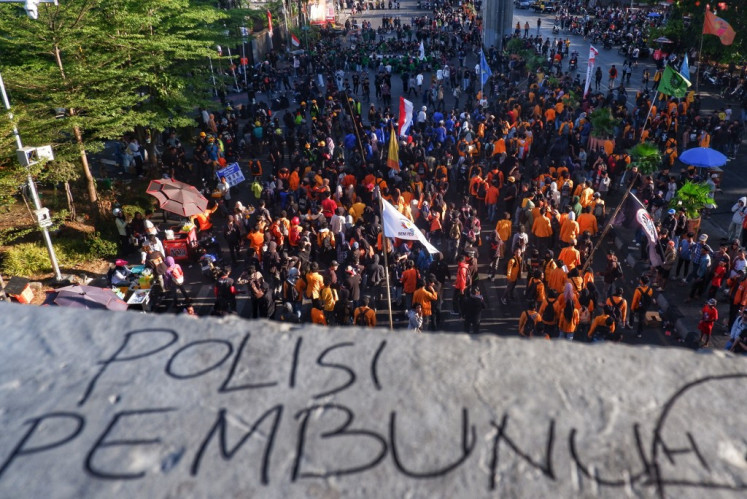Popular Reads
Top Results
Can't find what you're looking for?
View all search resultsPopular Reads
Top Results
Can't find what you're looking for?
View all search resultsGovt calls HRW ‘naive’ for report on growing intolerance
Presidential spokesperson Julian Adrian Pasha is calling Human Rights Watch (HRW) “naive” for its report released on Thursday highlighting abuses against religious minorities in Indonesia
Change text size
Gift Premium Articles
to Anyone
P
residential spokesperson Julian Adrian Pasha is calling Human Rights Watch (HRW) “naive” for its report released on Thursday highlighting abuses against religious minorities in Indonesia.
“They should see Indonesia in its entirety, with its diversity and pluralism,” Julian said. “Even in a homogenous country there is friction between groups,” he said.
The 107-page report released by the New York-based group, titled In Religion’s Name: Abuses Against Religious Minorities in Indonesia, said that President Susilo Yudhoyono’s has been inconsistent in defending religious freedom.
The report also said that the government had been complicit in the persecution of religious minorities by failing to enforce laws and issuing regulations that breached minority rights.
Phelim Kine, the deputy director of the Asia Division of Human Rights Watch, said on Thursday that Yudhoyono was “failing to sanction those members of his government, his government’s officials and members of the police and security forces who have been passively or actively complicit in acts of religious intolerance and violence”.
Religious hard-liners have carried out hundreds of attacks local religious minorities such as the Ahmadis, Shia, Christians and Bahai.
The intimidation and attacks have been part of a growing trend of religious intolerance in Indonesia, according to HRW. Setara, a local organization monitoring religious freedom in Indonesia, documented 264 cases of violent attacks against religious minorities in 2012, up from 244 cases in 2011 and 216 cases in 2010.
In August, for example, one man was killed as a mob of 1,000 Sunni Muslims razed 37 homes belonging to Shia Muslims in Madura, East Java, while in February 2011, three Ahmadis were killed as 1,500 Islamist militants attacked an Ahmadi community in Cikeusik, Banten.
The report said that the perpetrators have mostly come from militant Sunni groups that were “at times acting with the tacit, or occasionally open, support of government officials and police”.
The central government has also not prioritized the investigation of incidents of religious intolerance and violence for police and security forces, the report said.
The HRW also reported the so-called Coordinating Board for Monitoring Mystical Beliefs in Society (Bakorpakem) for inhibiting religious freedom, saying that Bakorpakem, which is under the Attorney’s General’s Office, had been influential in pressing the decision to ban religious communities.
The report said that under Yudhoyono, Bakorpakem has had an active role in prosecuting people espousing views it deemed blasphemous to Islam, such as imprisoned Shia leader Tajul Muluk and the Alexander Aan in West Sumatra, who was imprisoned for posting pro-athiest statements on Facebook.
While Human Rights Watch also said that a 2008 joint ministerial decree that banned Ahmadis from propagating their beliefs was a license to violate the rights of religious minorities, Julian said that the extra-judicial attacks against Ahmadis in 2011 resulted from their non-compliance with the decree.
Julian also denied that the police did not have a clear direction under Yudhoyono.
“When they [police] are faced with a clash that involves a violation of the law, it’s very difficult for the police to protect others — that doesn’t mean that they do not protect the right to live and human rights.”
----
Report with 107 pages:
In Religion’s Name: Abuses against Religious Minorities in Indonesia
http://www.hrw.org/reports/2013/02/28/religion-s-name
Slide Show with 18 photos: Rising Violence against Religious Minorities
http://www.hrw.org/features/indonesia-rising-violence-against-religious-minorities










